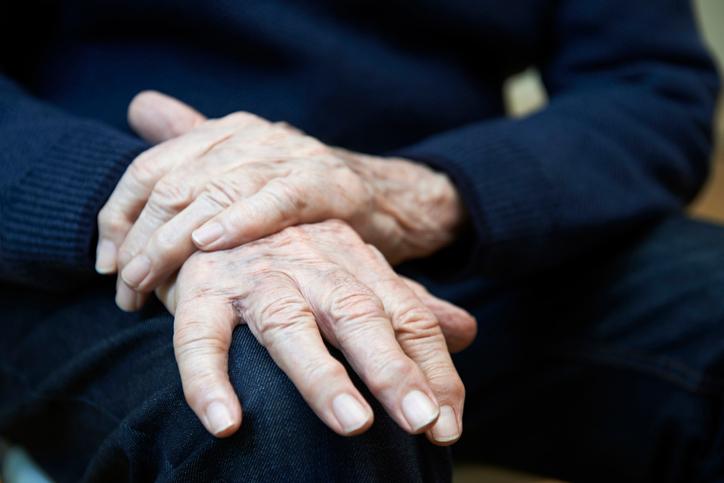
S'agit-il de la maladie de Parkinson ?
Révision par les pairs par le Dr Colin Tidy, MRCGPDernière mise à jour par le Dr Sarah Jarvis MBE, FRCGPDernière mise à jour : 14 juillet 2020
- TéléchargerTélécharger
- Partager
La maladie de Parkinson affecte les cellules du cerveau et les nerfs qui vous aident à bouger vos muscles de manière coordonnée. Elle touche principalement les personnes de plus de 50 ans - environ 1 personne sur 200 dans la soixantaine et 1 personne sur 50 chez les plus de 80 ans. Il existe des exceptions - Michael J. Fox a développé la maladie à un jeune âge - et chez les personnes plus jeunes, la maladie est plus susceptible d'être héréditaire.
Dans cet article :
All your muscles are controlled by messages from your brain, passed along nerves cells which run through your spinal cord. Various chemicals called neurotransmitters transmit these signals. Different parts of your brain control different functions - movement, sight, sensation, thought processes, emotions.
The part of your brain which controls smooth muscle movements mainly uses a neurotransmitter called dopamine. In Parkinson's disease, cells in this part of the brain gradually die, reducing the amount of dopamine your brain produces.
Poursuivre la lecture ci-dessous
Symptômes précoces
Symptoms of Parkinson's disease often come on fairly gradually and may be mistaken for just getting older. This is particularly true of one of the three main groups of symptoms - slowness of movement. You may start to walk more slowly, or find it harder to get up from sitting or lying. As time goes on, you walk with a shuffle, and once you get going you have trouble stopping or turning.
The other main symptoms are more typical of Parkinson's:
Shaking or 'tremor' which is most noticeable when you're at rest or anxious and mostly affects your arms and hands. It doesn't always happen and may come on after the other symptoms. It usually improves when you're moving your hands.
Muscle stiffness can make it hard to make fine movements, like picking up small objects, or writing. Your writing often becomes smaller; you may find it harder to swing your arms when you walk; and your balance may be affected, making you prone to falls.
Parkinson's can also affect muscle movement in your face, slowing your speech and leading to a face and voice lacking in expression. A dear friend of mine with Parkinson's deals with his condition with great humour - he likes to remind me that these days he'd make a great poker player because his face never changes.
Later stages
As time goes on, some people develop other symptoms including bladder problems, constipation, tiredness, hallucinations and sleep issues. Balance can be affected, making you prone to falls and, in the late stages, it can be hard to swallow. This makes you prone to 'aspirating' food into your lungs, which can leave you prone to infections, including pneumonia. However, many patients have fairly mild or stable symptoms for several years.
People with Parkinson's are also prone to depression and anxiety. You might imagine that this would happen more as your condition worsens - in fact, people with mild symptoms are also more likely than average to develop symptoms of depression. Treatment with medication and talking therapy is often effective. There is also a link between Parkinson's and dementia - about half of people with Parkinson's develop it. However, it rarely affects younger people with Parkinson's.
Choix des patients pour Problèmes de mouvement

Cerveau et nerfs
Quel est le lien entre la maladie de Parkinson et la démence ?
La maladie de Parkinson et la démence sont des affections distinctes, de nombreuses personnes développant l'une sans l'autre. Cela dit, les personnes atteintes de la maladie de Parkinson présentent un risque plus élevé de démence, en particulier au cours de la vieillesse. Les deux principaux types de démence que les personnes atteintes de la maladie de Parkinson peuvent développer sont la "démence de Parkinson" et la "démence à corps de Lewy".
par Amberley Davis

Cerveau et nerfs
Maladie de Parkinson
Les principaux symptômes de la maladie de Parkinson sont généralement la raideur, les tremblements et la lenteur des mouvements. Les personnes atteintes de la maladie de Parkinson peuvent également développer d'autres symptômes (énumérés ci-dessous). Les symptômes s'aggravent progressivement avec le temps. Le traitement permet souvent de soulager les symptômes pendant plusieurs années.
par le Dr Colin Tidy, MRCGP
Poursuivre la lecture ci-dessous
Management and treatment
Although there is no cure for Parkinson's, there have been significant advances in treatment in recent years. A new form of brain surgery called deep brain stimulation can make a dramatic difference to movement problems for some people.
At first, you may not need any treatment. When symptoms become more troublesome, you're likely to be offered medication which increases the amount of dopamine in your brain. Levodopa produces significant improvement for most people, although feeling sick can be a problem at first.
Over time, levodopa tends to become less effective, and can lead to troublesome muscle problems. If either of these happen, your team can adapt your medication. But medications are only part of the management.
You should be referred to a specialist clinic; most of these have a specialist Parkinson's nurse who will be your first port of call. They can provide information and support, as well as monitoring your treatment and adjusting it if needed. They will take advice from a consultant neurologist. Other members of the team who can help include a physiotherapist, an occupational therapist (for home adaptations if needed) a dietician and a speech and language therapist to help with swallowing and speech issues.
If your loved one has Parkinson's, don't forget to speak with your GP about your needs - you're eligible for an annual carer's assessment.
Nous remercions le magazine My Weekly, où cet article a été publié à l'origine.
Historique de l'article
Les informations contenues dans cette page ont été évaluées par des cliniciens qualifiés.
14 Jul 2020 | Dernière version

Demandez, partagez, connectez-vous.
Parcourez les discussions, posez des questions et partagez vos expériences sur des centaines de sujets liés à la santé.

Vous ne vous sentez pas bien ?
Évaluez gratuitement vos symptômes en ligne